- Home
- Hammond Innes
The Trojan Horse Page 2
The Trojan Horse Read online
Page 2
I lit a cigarette and tried to think it out. Then I picked up the letter and ran my pencil round under the flap. Inside was a single sheet of paper. I glanced through it and then put it back in the envelope and resealed the flap. An affectionate farewell from a man to his daughter. The phrases run in my memory now, and whenever I think of them I have a sense of guilt at having intruded upon something very precious to two people who had suffered much and loved each other greatly. Short though it was, the letter said everything there was to be said, and the words remain with me as something very beautiful. The man’s sense of impending death showed quite clearly between the lines. He did not fear death. But he feared for his daughter’s safety in the face of a danger that, reading the letter, I could not believe was unreal. This fear showed in the postscript which read, ‘The man with whom I have left this letter is Mr Andrew Kilmartin. He knows my story and will have all the information that up to the time of my death I had obtained concerning Them. He will advise you. But until They have been unmasked, promise me to give up the work and disappear. I shall not rest happy if I think you are in danger.’
To read that letter was to feel that he had found it necessary to return to my chambers to bind a wavering man to his promise. How could I ring Crisham after reading that letter? It was not the letter of a madman – or was it? That beauty, that sincerity might all come of madness. I had seen cases like that before. If only he had told me where I could get hold of Freya Schmidt. She held the truth of the matter. But he had told me nothing to guide my next step except that melodramatic stuff about taking the face from the barbican and the clue being the cones of runnel.
At that moment the clerk came in to inform me that the court had just phoned him to say that the case of Rex v. Lady Palmer would be heard the next day, instead of on Thursday. It was a dangerous driving case, and though I did not imagine it would take long, it was one of those troublesome briefs that take a lot of preparing. The change of date made it imperative that I should get down to it right away. I decided to do nothing about Schmidt for the moment. I had given my word and there was that letter. I was convinced that he was not dangerous.
I spent most of the following day in the court and returned to find that I had been briefed at the last moment for a drug peddling case due to be heard at the Old Bailey on Thursday, the K.C. who had originally been briefed for the case having suddenly joined the Ministry of Supply. This rush of work gave me little time to consider the case of Franz Schmidt. But I was able to make one inquiry. On the Wednesday night I dropped into the Clachan, which is quite close to my rooms in the Temple. I had a drink with one or two of the Fleet Street boys whom I knew and was introduced to a fellow in the Press Section of the Air Ministry. On the offchance that he might be able to find out something, I asked him to see if the contracts branch of the Air Ministry knew anything about a man called Franz Schmidt or Paul Severin, and if so, whether they had approached the Calboyd Diesel Company and had been told that he was a crank. ‘Oh, you’re expecting to be briefed, are you?’ he said. Then he turned to the others and said, ‘There’s a wee bit news for you, boys – Mr Kilmartin to defend Franz Schmidt.’
I shrugged my shoulders. ‘I don’t think so,’ I said. ‘I’m just interested, that’s all.’ My tone was final and they accepted it that way. But the fellow phoned me on Friday morning, just as I was leaving for the court, to tell me that I was quite correct. A Paul Severin had approached the Air Ministry in July, 1939, with the request that they test for aircraft use a diesel engine he had produced. He explained that it was much lighter than any at present in existence as a result of the use of a special alloy he had discovered. He was very secretive about the alloy and was full of conditions as to how they should test it. He wouldn’t let the engine out of his sight. The Air Ministry had then got on to Calboyds’, who handled all their diesel engine experiments, and had asked them if they knew of Severin. They had replied that he had already approached them and that they had tested the engine. The metal he had used was a well-known durable alloy and it had not, in their opinion, been sufficiently strong to stand up to the pressure it would have to bear. They had described him as a crank who was a little unbalanced.
Well, that was one part of his story corroborated. But was his interpretation of it right? His point had been that here was a big industrial firm queering his pitch in an effort to force him to sell the plans and the secret of the alloy to them outright. But supposing Calboyds’ summing up had been right? I had no time to go into the matter more closely, and I decided to wait till Monday. If he didn’t turn up then, it was a case for the police.
I completed the drug case on Monday morning and returned to my chambers somewhat dispirited. The case had been hopeless from the start, and as briefs had been much fewer since the outbreak of war, I liked to be successful with those I did obtain. Schmidt had not called. I went out and had lunch at Simpson’s in the Strand as an antidote to depression. I did not return to my chambers until past three. Schmidt had still not arrived. I sat in my office and smoked a cigar. The brief spell of work had exhausted itself. I had not a single case in prospect. I found myself involuntarily listening for the sound of someone entering the outer office. I had tea. There was still no sign of Schmidt. I let Hopkins and the typist go. There was nothing for them to do.
By five o’clock I was no longer waiting impatiently for him to come. I knew he would not come and I was wondering what I was to do. The most obvious course was to get in touch with the police. But I remembered his words about not finding it a case for the police at first. And there was that letter. The man had seemed so certain that he was going to die. I owed it to him to go round to his digs and make a few inquiries. Nevertheless, it was a police affair. I ought at least to get Crisham to come along with me. I rose from my chair by the fire and crossed to the phone. I hesitated on the point of lifting the receiver. That stuff about the face from the barbican and the clue being the cones of runnel. I could hear Crisham’s soft sardonic chuckle. He was a hard-headed man, who believed in facts – and nothing else. He’d come, of course, but he’d say at once that the man was mad, and his only interest would be to trace Schmidt’s whereabouts.
I went over to the door instead and got my hat and coat. My mind made up now, I hurried out of my chambers and up Middle Temple Lane and hailed a taxi in Fleet Street. We ran through a darkened Strand and by way of St Martin’s Lane to Cambridge Circus. I was deposited outside a derelict-looking house practically opposite the stage door of the London Casino. It had once been a shop, but the windows were boarded up and the place had a shut look. I paid off my taxi and then flashed my torch on to the door. The figures 209 showed black against the cracked green paint, and below was a little sign which said ‘Isaac Leinster, Bespoke Tailor’. I found an electric bell, that had lost its covering, and rang. No sound came from the other side of the door. I waited, and then rang again. No one answered. I knocked on the door. Then I stepped back and looked up. The aged brick face of the house towered above me, blank and sheer.
I played my torch over the door again, looking for another bell to ring, and I saw that it was not quite shut. I pressed against it, and it opened. I went in and found myself in a bare passage, with two dustbins in it, leading to uncarpeted stairs. I hesitated. I was not over keen on walking into a house on Greek Street that I did not know. But in the end I climbed the stairs and on the first floor I found a door with ‘Isaac Leinster’ on it, and there was a line of light showing beneath.
I knocked and heard feet shuffling across bare floorboards. The door swung open and a small man with thick lips and a bald head stared at me out of little beady eyes. ‘Vat is it you vant?’ he asked.
‘I’m sorry to bother you,’ I said, ‘but I’m looking for a friend of mine who lives here.’
‘Vat is ’is nime?’
I hesitated. What was his name? He surely wouldn’t have given it as Severin? Then in a flash I remembered what he had told me about his parentage. ‘Mr Frank Smith,’ I said
and I began to describe him.
The other held up his hand. ‘I know. But Mr Smith is not ’ere now. ’E ’as ’ad an accident and is in ’ospital.’
‘Which hospital?’ I asked.
He shrugged his shoulders. ‘’Ow do I know?’ he complained. ‘A gent goms ’ere on Thursday, says ’e ees from the ’ospital and can ’e ’ave Mr Smeeth’s clothes. Vat do you vant?’
‘Well,’ I said. ‘I left some rather important scientific papers with him. He promised to let me have them back by last Friday and I’ve got to give a talk on them tomorrow evening.’
He looked me up and down, and then said, ‘Veil, you’d best go up and look for them. Another three days and you’d ’ave been too late. ’Is rent is due on Thursday and I’ll ’ave to clear all ’is junk out You’ll find the door open. It’s right at the top.’ And with that he closed the door.
I went on up the stairs and eventually came to the top landing from which a wooden staircase, obviously put in at a later date, rose sharply to a green-painted door. I climbed this and knocked at the door. There was no answer, so I pulled the string of the latch and went into what was apparently a penthouse. I switched on the light. It was a largish room, the ceiling sloped to a skylight, which was boarded up because of the black-out. It had probably been built as a studio, for there were glimmerings of the artistic in its construction that were noticeably absent from the rest of the house.
The furniture appeared to be the sweepings of the second-hand market. There was a double bed in the corner under the window, all brass and cast iron, two old kitchen chairs, an uncomfortable-looking Victorian armchair, complete with a very dirty antimacassar, a dresser of plain wood and a little mahogany table that had been good, but was now split right down the centre. In the far corner was a sink, half-filled with dirty dishes. The place was indescribably filthy and very untidy. There were crumbs all over the floor where vermin had got at a loaf, which lay crumbling on the table.
I looked round in some bewilderment. ‘Go round to my lodgings and take the face from the barbican,’ Schmidt had said. A barbican was the outer defences of a castle. How could there be a barbican in this hovel? There weren’t any pictures and there was nothing that looked remotely like a barbican. I couldn’t even see a face anywhere. A sense of frustration seized me. I had been so busy recently that I had not bothered to think out the significance of Schmidt’s words. Or were they just the ravings of an unbalanced brain?
I went over to the dresser and pulled out one of the drawers. There were clothes in it and some handkerchiefs that were clean and had the ironing creases in them, though they were jumbled up with the rest. I tried the next drawer, and here again clean clothes had been jumbled up in an untidy heap. The man from the hospital must have been in a hurry in his search for the right clothes. But why should he have been in such a hurry?
I turned and looked at the room again. It was untidy, but the untidiness was methodical. The bedclothes were all bunched up and loose where the mattress had been flung back, the tattered linoleum was bent up all round the walls and the books in the little bookcase by the fireplace were not all the right way up. The room was not untidy because it had been lived in. It was untidy because someone had searched it thoroughly.
A little pile of books on the floor caught my eye because on the back of them I noticed a woman’s face and it had suddenly given me an idea. I went forward and picked it up. It was an Ethel M. Dell. I knelt down and went slowly through the bookcase. On the second shelf, in a batch of five that had been put back upside down, I found what I was looking for. It was a recently purchased thriller and on the jacket was a man’s face framed in a barbican. It was called The Face from the Barbican and was by Mitchel Cleaver. I stood up and flicked through the pages. But there was no letter there, nothing written. I felt disappointed. Then I began to consider what Schmidt had meant by the cones of runnel. I thought it possible that it might be the title of another book.
As I bent down to run through the bottom shelf, I heard the sound of a door closing and was immediately conscious of the house that lurked in the dark below me. I stood up and went to the door. All was silent as the grave. Then suddenly a stair creaked, and then another. I heard the creak of the banisters and, in the silence, I could hear a man’s deep breathing on the staircase below me. I thought of the man who had searched the room before me. Had he been looking for what I had found?
I switched off the light and waited. There was no place to hide. I could hear the man’s breathing quite plainly now as he climbed to the landing immediately below me. Had they been watching the house or was it one of the people who lived there? Why had Schmidt been so certain he would die? The man reached the landing, and I sensed him turn towards the last flight. I braced myself. By lifting myself on the banisters I could use my feet.
‘Is any van there?’ It was the voice of the Jewish tailor. A sense of relief flooded through me. ‘Yes, I’m just coming down,’ I said, and switched on my torch. He was standing on the landing below with his hairless head craned up towards me.
‘Did you get vat you vanted?’ he asked.
‘Yes, thanks,’ I said, as I came down the stairs. ‘I’ve taken the papers and also a book I lent him.’
He nodded. ‘If you see ’im, tell ’im I vill ’ave to let the room on Thursday unless ’e pays me the next veek’s rent. A man ’as got to live, yes? But I vill keep ’is things in my shop vor a week, tell ’im. I do not vish to be ’ard.’
I thanked him and hurried on down the stairs.
CHAPTER TWO
THE MESSAGE COMES AND GOES
By the time I had reached the bottom of the stairs I was almost running. I had my torch, but outside that reassuring beam the house pressed about me, dark and silent. The blank doorways on the landings seemed to crowd forward to watch me pass, shadows leapt back as I flashed my torch and the walls threw the sound of my footsteps back at me as though, hurry as I might, I should never leave the house. It was a childish fancy. But a strange house is like that. So long as you ignore it, it will take no notice of you. But once you become aware of it, it closes round you, colouring your imagination with its own atmosphere. This house was unfriendly, and it was with a sense of relief that I pulled open the door and went out into Greek Street.
But even in the street, I could not shake off that feeling of being watched. It was very dark and the houses rose on either side, blank like walls. I sensed rather than saw the movement of people about me. They were vague shadows, distinguishable only by the flicker of a torch until they appeared suddenly in the light of my own torch, passed me and were swallowed by the darkness again. A woman’s voice spoke to me and for a moment I saw white, red-lipped features at my side as she shone her torch on her face. And all the time I was walking towards Shaftesbury Avenue, I had that sense of being watched. It was as though I were being followed.
I became so certain of this that I turned sharp left towards Charing Cross Road and slipped into the doorway of a tobacconist. Several figures passed along the pavement. None of them were anxiously peering ahead or hurrying as though to catch someone up. Mentally I pulled myself together. The house and my discovery that Schmidt’s rooms had been searched had obviously got on my nerves. I began to think of food, and decided on Genaros on the other side of Charing Cross Road.
I left the shelter of the tobacconist’s and continued along the pavement. As I came out into Charing Cross Road, I was checked by a flood of people crossing my path. They had been held up by a car and had just crossed the road. And as I slowed up, a man hurrying in the direction of Cambridge Circus, cannoned into me. I only just managed to keep my feet and I felt the book slide from underneath my arm. I made a wild clutch at it and it fell to the ground. ‘I’m so sorry,’ a voice said. A torch was flicked on to the book where it lay, face up on the muddy pavement, and the man bent quickly down to retrieve it. I saw a hand dart into the beam of the torch as I dived for the book. The white line of a scar showed across the knuckles. The f
ingers were almost closing on it when the feet of the passers-by suddenly swung closer and a foot kicked against it, sliding it towards me across the pavement. In an instant my hand had closed on it.
I straightened myself, the blood drumming in my ears. The man said, ‘So sorry, I’m afraid it’s got dirty.’ I swung my torch up towards him, but he had disappeared into the crowd. The incident left me with an uneasy feeling. Either I was being a fool or else the man who had searched Schmidt’s digs had failed to find what he had known to be there, and waited to see if anyone would come to show him what it was. I hurried across Charing Cross Road and into New Compton Street. I remembered how the Jew, Isaac Leinster, had hesitated at the foot of the stairs leading up to Schmidt’s room whilst I stood waiting for him at the top. I remembered, too, how he had come up the stairs from his own room so quietly that it was his breathing and not his footsteps that I had heard. Small though he was, he was a heavy man and the stairs were uncarpeted. And there was the unfriendly watchfulness of the house as I had left it. Had that all been imagination?
I turned into the entrance of Genaros and in the warm friendliness of the place, my fears melted away. As I ordered my dinner, I thought of a time when I had been scared on Dartmoor for no earthly reason. Anything can seem curious if your senses are keyed up to misinterpretation. I chose my dinner carefully. Then, having wiped the dirt off the back of the book, I opened it and began to look through it for some mark that would indicate what I was expected to find.

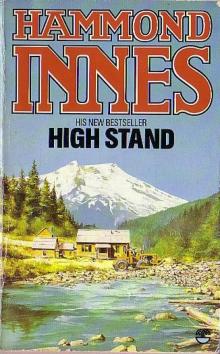 High Stand
High Stand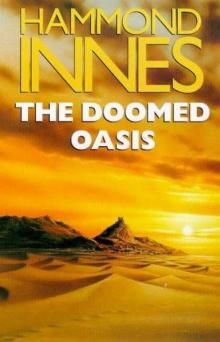 The Doomed Oasis
The Doomed Oasis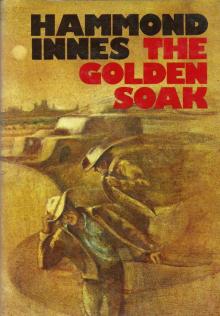 Golden Soak
Golden Soak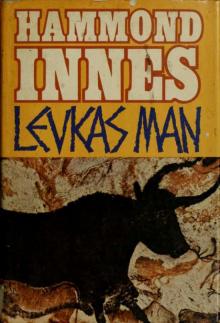 Levkas Man (Mystery)
Levkas Man (Mystery) The Strange Land
The Strange Land Dead and Alive
Dead and Alive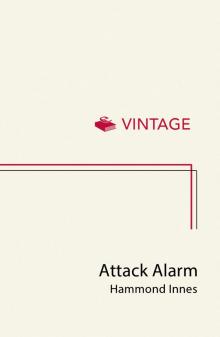 Attack Alarm
Attack Alarm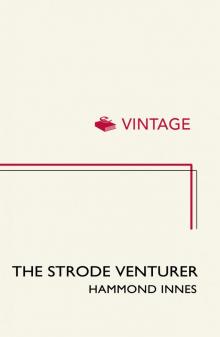 The Strode Venturer
The Strode Venturer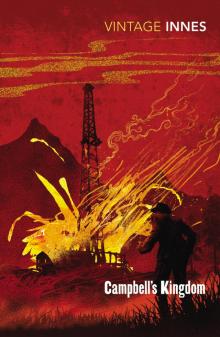 Campbell's Kingdom
Campbell's Kingdom North Star
North Star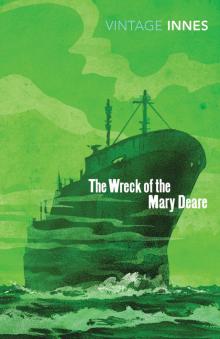 The Wreck of the Mary Deare
The Wreck of the Mary Deare The Lonely Skier
The Lonely Skier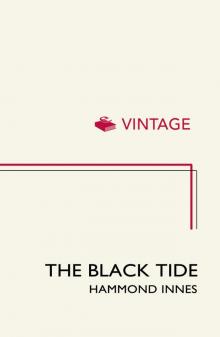 The Black Tide
The Black Tide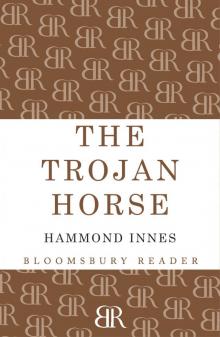 The Trojan Horse
The Trojan Horse Medusa
Medusa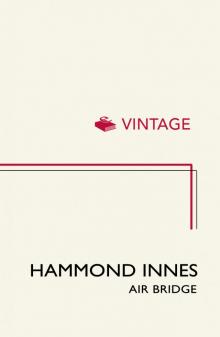 Air Bridge
Air Bridge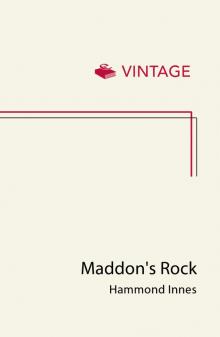 Maddon's Rock
Maddon's Rock The Angry Mountain
The Angry Mountain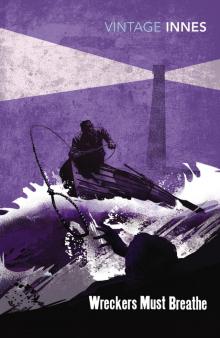 Wreckers Must Breathe
Wreckers Must Breathe Solomons Seal
Solomons Seal The White South
The White South